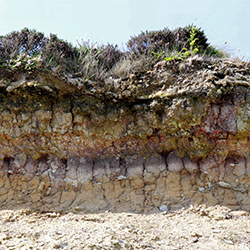
Soil as a Landscape
International Landscape Study Days
2020, sixteenth edition
Thursday 20th and Friday 21st February
Nature, crossings and immersions, new topographies
The theme of soil, in both the past and present, has often been considered purely from a quantitative point of view, rather than being seen as a substance that is waiting for us to attribute to it functions and uses; this surface covering our Earth has no dignity of its own, yet it is a necessary part, for example, of occupation and urban transformation processes.
Town planning, earth sciences, economics and political ideology now approach this topic from different angles, reflecting viewpoints that are restricted to their cultural and scientific background. The aim of the 2020 Landscape Study Days is to shift attention onto the nature and importance of soil itself, before tackling the subject of how we want to use and transform it, looking at it in an inclusive way as if it were a travelling companion and not something to be stolen, an inescapable reality that accompanies man and his time on Earth and that guides our perception of the environment we live in and our awareness of the landscape.
The title of the Study Days – Soil as a landscape– presents an apparently simple combination of words, given how close our considerations of the landscape and wide, open, undeveloped space are. Growing interest in the topic of land, however, encourages us to dig more deeply and these days will explore “soil as a landscape” and not only “soil and landscape”. While soil is often (and rightly) referred to purely in terms of consumption, bringing our attention to the multiple forms of impoverishment our society wreaks on our towns, cities and land, we seldom focus on the very nature (or natures) of soil in its different environmental, ecological, aesthetic and social contexts. During our discussions, we will examine soil as a connective tissue, nourishment and a vital process which accompanies our life experiences, a physical and aesthetic dimension where the essence of inhabited places and the very meaning of our belonging to the landscape lie.
The Study Days programme is divided into three sections which deal with themes such as, in the first section, the “natures” of soil, namely the different forms, whether they be scientific, social or aesthetic, which help us broaden the concept of soil. The second part focuses on urban themes, topics that are more often than not the subject of debate due to the intensity of current conflicts, but which also provide us with experimental projects. The third section presents a wide range of experiences, from the subject of gardens – like Derek Jarman’s, cultivated on contaminated soil – to more complex issues, like the Land of Fires and the Ruhr Basin, where abandoned industrial areas have been reclaimed to create opportunities for a new project-oriented mind-set, with the soil as the starting point. There will also be testimonies and reflections concentrating on a more aesthetic and philosophical approach, where soil represents exile and reinvention, or a kind of landscape conscience, whether personal or collective, borrowed from interaction with art.
